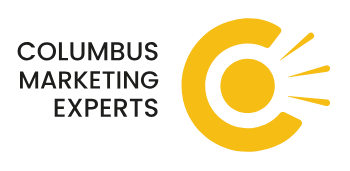FAQ
How does Columbus Marketing Experts typically work with clients?
Columbus Marketing Experts works as a long-term growth partner rather than a one-off vendor. Engagements are structured around clear goals, defined priorities, and ongoing evaluation so marketing efforts remain focused and intentional over time.
How are recommendations and priorities determined?
Recommendations are based on business goals, current performance, and where clarity or consistency is breaking down. We prioritize actions that create meaningful progress rather than chasing trends or isolated tactics.
How involved do clients need to be in the process?
Client involvement varies by preference. Some clients collaborate closely with regular check-ins, while others rely on us to manage execution with periodic updates. We adapt our process to match how each business operates.
Do services need to be used together to be effective?
No, but they work best when connected. Individual services can address specific challenges, while an integrated approach creates consistency across visibility, trust, and lead generation over time.
How do you approach ongoing optimization and adjustments?
We regularly review performance and make adjustments based on real outcomes rather than assumptions. This ensures effort stays focused on what is working while adapting to changes in the business or market.
What kinds of businesses tend to see the best results?
Yes. While we are based in Ohio, we work with businesses in other locations when there is strong alignment, clear communication, and shared expectations.
Do you work with businesses outside of Ohio?
Yes. While we are based in Ohio, we work with businesses in other locations when there is strong alignment, clear communication, and shared expectations.
What does success look like in a typical engagement?
Success looks different for each business, but it often includes improved clarity, stronger visibility, more consistent inquiries, and greater confidence in marketing decisions over time.
What is the first step to see if this is a good fit?
The first step is a conversation to understand goals, challenges, and expectations. From there, we determine whether working together makes sense and what the next step should be.
This page is designed to provide clarity about how we work. For details on specific services, visit our service pages.
Ready to See
What Growth
Could Look Like?
The Growth Review helps you understand how your business is being found, trusted, and converted revealing where growth is slowing down and what to prioritize next for sustainable results.

—— Our Reviews ——
Success Stories From
Those Whos Trust Us
Discover how our clients turn strategy into real impact. These stories highlight authentic achievements, meaningful progress, and the confidence built through our partnership. Let their experiences inspire your next step toward smarter, stronger marketing.
EXCELLENTTrustindex verifies that the original source of the review is Google. I requested a website review from them, and they gave me a full breakdown with priorities. It helped me fix things I didn’t even realize were hurting my site.Posted onTrustindex verifies that the original source of the review is Google. Someone I wish I had found much sooner… so hoping to help anyone reading this! Neil runs one of my favorite advertising companies in Columbus Ohio (and the United States in general). It’s one thing to be knowledgeable and it’s next level to know the intricacies of marketing that he does - while delivering his solutions in such a thorough way. He is kind and patient as he listens to concerns and objectives in goals - asks questions to truly understand and know exactly how to overcome issues I’ve had. I can’t say enough about him. Save yourself time, headaches and ultimately money and hire Neil TODAY!Posted onTrustindex verifies that the original source of the review is Google. Columbus Marketing Experts has been a huge help for my business. They handled our branding agency needs, designed a clean and functional website as our website designer, and even worked with us as a media consultant to improve our online strategy. Everything now feels cohesive, and we’re already seeing results.Posted onTrustindex verifies that the original source of the review is Google. I hired Columbus Marketing Experts to help me get ahead with AI-powered search results. They knew exactly how to optimize my site and Google profile for voice search and AI answers. Within a month, I saw a jump in my impressions and traffic from tools like ChatGPT and Google SGE. Neil explained the new AI trends in simple terms and set up the right content structure for me. I’ve never felt more confident about where the internet is heading. Highly recommend for any business wanting to future-proof their SEO.Posted onTrustindex verifies that the original source of the review is Google. We started working with Columbus Marketing Experts three months ago to help us improve local visibility for our home services business, and the results have been outstanding. From day one, the team was professional, responsive, and laser-focused on our goals. They performed a complete audit of our existing online presence, cleaned up duplicate listings, optimized our Google Business Profile, and even helped us rework the copy on our website to improve conversion rates. Within 30 days, we started seeing a significant increase in calls and form submissions, especially from high-intent local customers. Their communication was also impressive. Weekly check-ins, transparent reporting, and actual data to back every recommendation. When our Yelp listing was flagged for suspicious activity (through no fault of theirs), they proactively reached out to Yelp support and got it resolved within a week. They also ran a targeted Google Ads campaign that brought in 3X ROI in the first 6 weeks, and they’ve been fine-tuning the ad copy and keyword strategy based on real-time results. If you're a local business in Columbus or the surrounding area looking for a marketing partner that treats your business like their own, I can’t recommend Columbus Marketing Experts enough. They're not just marketers—they’re problem solvers.Posted onTrustindex verifies that the original source of the review is Google. Neil was great to work with on our SEO project. They helped us understand how to accomplish what we were trying to do and improved our rankings on several key search terms. I'd recommend them to others!Posted onTrustindex verifies that the original source of the review is Google. Working with Neil and Columbus Marketing Experts has been a complete game-changer for my business, Ivy Insights Behavioral Health Billing. Neil and I originally connected because I handle the billing for his therapy practice, Thera-Fi, and from there, he’s become an invaluable part of helping me build and grow Ivy Insights. One of the biggest impacts he made early on was helping me regain access to my Google Business Profile after months of being locked out. He not only showed me how to fully leverage it through Google Business Profile Optimization but personally set up and continues to help manage it. When I faced additional challenges verifying my listing after a business name change, Neil walked me through exactly what to do step-by-step, making what could have been a complicated process feel simple and manageable. Beyond just setup, Neil provided me with a clear marketing strategy tailored to growing a behavioral health billing company. He offered SEO training, website optimization recommendations, and even a free SEO report to help me better understand where Ivy Insights could compete and grow online. His insights into competitor analysis were eye-opening, helping me see not just where I stood — but how to move ahead. In just a few weeks of implementing his strategies, I’ve already seen major improvements: Increased views and clicks on my Google Business Profile An inquiry from a potential client who found me through Google search Stronger overall online visibility and confidence in my marketing plan Neil also introduced me to a talented web developer to continue improving my online presence, showing that he’s not just focused on a single service — he’s committed to helping businesses succeed at every level. If you’re looking for real results — not just buzzwords — I cannot recommend Neil and Columbus Marketing Experts enough. His expertise in marketing strategy, SEO, and business development is unmatched, and he genuinely cares about the success of the businesses he works with. (I'll also be posting a few pictures soon showing some of the early growth and progress Ivy Insights has made thanks to Neil’s support!)Posted onTrustindex verifies that the original source of the review is Google. If I could give more stars I could. Columbus Marketing Experts - and Fonder Neil Colvin are FANTASTIC. I've worked with them myself (examples include SEO, website development, LinkedIn strategy and tactics, awareness growth, revenue generation, google business profile) and have been experiencing notable results. I also continually referred them to others. Their knowledge, insights, and wisdom in digital marketing are incredible - and they are a pleasure to work with to say the least. You can expect them to be efficient, effective, customer service centric, results oriented, and FUN. 5 million stars

